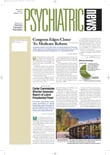All too often, promising mental health care interventions offered to research subjects don’t translate into everyday practice once funding runs dry and the study ends.
But what if a study is designed so that its benefits endure long after the researchers have hung up their lab coats and gone home?
This is the goal of researchers on the Rural Appalachia Project, a multilevel study to help young people with emotional and behavioral problems referred to juvenile courts in eight poor, sparsely populated counties in the rural Appalachian mountains of east Tennessee.
While youth receive intensive home-based treatment, clinical psychologists will act as “change agents” to forge new links with community leaders such as judges and school administrators to rally support for the intervention.
The project is being funded by a five-year, $4 million grant from the National Institute of Mental Health.
Multisystemic Therapy Used
As part of the study, 720 adolescents aged 9 to 17 who are sent to juvenile court for various offenses will be recruited by researchers beginning this fall. They will be evaluated and randomized into two groups.
Half of the children selected in each county will receive an evidenced-based practice called multisystemic therapy (MST), and the other half will receive care in the community.
MST is an intervention in which a mental health clinician—in this case, a social worker or psychologist—works with children and their families at home and in neighborhood settings to promote the child’s strengths and decrease problem behaviors. A goal of MST is to provide parents with the skills they need to address difficulties that arise in raising teenagers and to empower youth to cope better with family, peer, school, and neighborhood problems.
“Sixty thousand youths are referred to the juvenile courts in Tennessee each year,” Charles Glisson, Ph.D., told Psychiatric News. Glisson is the study’s principal investigator and director of the Children’s Mental Health Service Research Center at the University of Tennessee. “These kids are at risk for mental health problems that can follow them into adulthood.”
He described MST as “an intensive treatment in which therapists are on call 24/7” and in which therapists require not only the support of the parents but also that of teachers, coaches, and others in the community to change youngsters’ problem behaviors.
As part of the Rural Appalachia Project, MST will be provided by clinicians working for Youth Villages, Tennessee’s largest private children’s mental health service organization. The intervention will be funded by the Bureau of TennCare, the state’s Medicaid waiver program.
Create Community Support
While therapists work with the children and their families, psychologists trained in organizational development will head advisory groups in four of the eight counties to “facilitate the collaborative efforts necessary to make MST work,” Glisson said.
Their job is a challenging one—to change the social context in which MST is provided, he said, “by trying to eliminate the barriers to care that normally exist when you move a new intervention into an area like rural Appalachia.”
The psychologists will work with judges, school administrators, policymakers, and other community leaders to create an environment in which MST can be practiced long after the study ends—a possibility about which Glisson is hopeful. “If we can show that [MST] works, we’re optimistic that it will be sustained once the study is over,” he noted.
Researchers will evaluate the impact of MST on the mental health of the youth and the psychosocial functioning of their families at baseline and at six-month intervals. They will also track recidivism rates among youth in both groups.
There is some evidence to suggest that MST cuts down on recidivism among juvenile offenders. In 1995 Charles Borduin, Ph.D., and colleagues conducted a randomized trial with 176 juvenile offenders to compare the effectiveness of MST with that of office-based outpatient psychotherapy.
The researchers found that after four years, 71 percent of those who received individual therapy had been arrested at least once, compared with 26 percent of the youth in the MST group.
The study appeared in the August 1995 Journal of Consulting and Clinical Psychology.
Finally, the Tennessee researchers will compare the cost of MST with that of care in the community.
Glisson said he expects that MST will be more cost-effective because “children who receive MST may be less likely to enter state custody and residential treatment facilities, which are quite expensive.”
A press release on the Rural Appalachia Project is posted on the Web at www.nih.gov/news/pr/jul2003/nimh-28.htm. ▪
